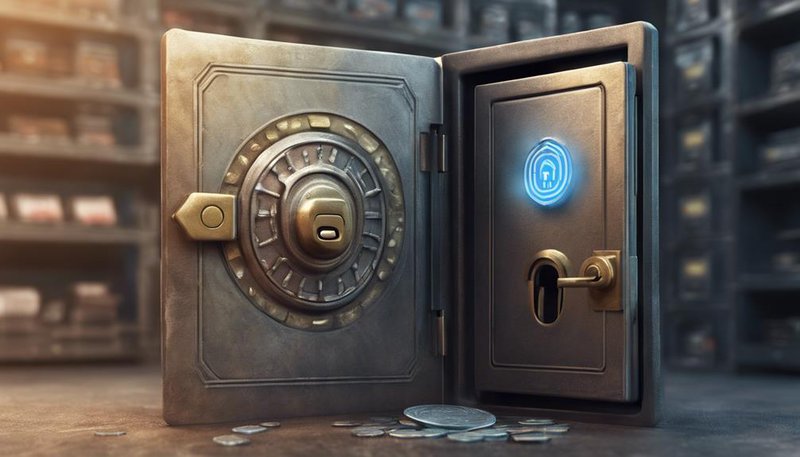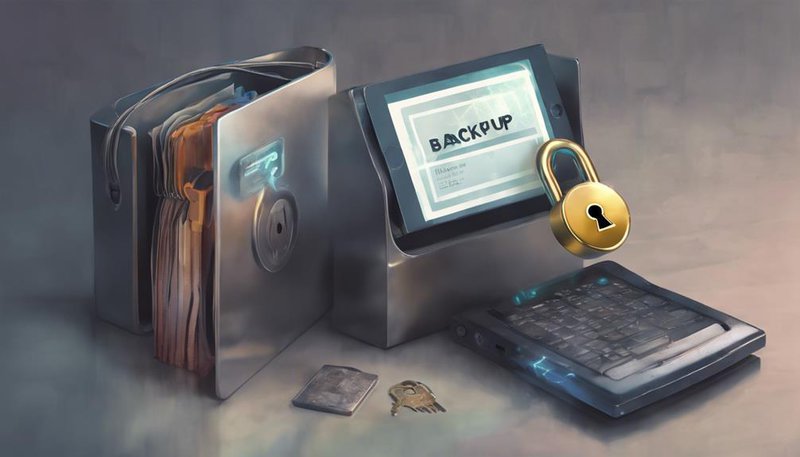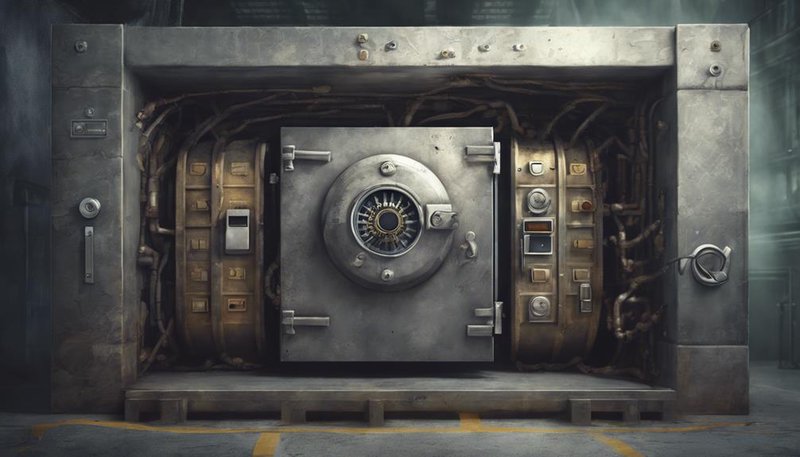How to Store Your NFTs Safely: Security Best Practices

NFT Security Best Practices: Safely Storing Your Digital Treasures.
Protect your NFTs with secure wallet storage, private key management, and strong defenses to ensure their safety in the digital world.
Importance of Secure Wallets
To safeguard your valuable NFTs, it's imperative that you utilize a secure wallet. Secure hardware and encryption techniques are vital components in ensuring the safety of your non-fungible tokens. A secure hardware wallet provides an extra layer of protection by storing your private keys offline, making it extremely difficult for hackers to gain unauthorized access to your NFTs. Encryption techniques further enhance security by encoding your data, making it unintelligible to anyone without the decryption key.
When it comes to securing your NFTs, investing in a secure hardware wallet should be a top priority. These wallets are specifically designed to protect your assets from potential threats in the digital realm. By utilizing encryption techniques, sensitive information is transformed into complex codes that are challenging to decipher without the proper credentials. This sophisticated level of security minimizes the risk of unauthorized access, providing you with peace of mind knowing that your valuable NFTs are safe and sound within your secure wallet.
Choosing the Right Wallet
When selecting a wallet for your NFTs, prioritize security above all else. Safeguarding your digital assets is paramount in the world of non-fungible tokens. Two main types of wallets exist: hardware and software wallets. Hardware wallets are physical devices that store your NFTs offline, providing an extra layer of security, while software wallets are digital applications accessible online. Consider the trade-off between security and convenience when choosing between the two.
| Wallet Type | Description |
|---|---|
| Hardware Wallet | Physical device providing offline storage |
| Software Wallet | Digital application accessible online |
Another crucial consideration is the storage method: cold vs hot storage. Cold storage refers to keeping your NFTs offline, disconnected from the internet, hence reducing the risk of hacking. On the other hand, hot storage involves storing your NFTs online, making them more accessible but potentially more vulnerable to cyber threats. Choose wisely, weighing the pros and cons of each option to ensure the safety of your valuable digital assets.
Safeguarding Private Keys

When it comes to safeguarding your private keys, it's crucial to consider key storage options and implement effective key management tips.
Your private keys are the gateway to your NFT assets, so ensuring their security is paramount.
Key Storage Options
Securely safeguarding your private keys is paramount when it comes to storing NFTs safely. Your private keys are the gateway to your digital assets, and protecting them should be your top priority. Consider utilizing cold storage methods like hardware wallets or paper wallets to keep your keys offline and safe from cyber threats. Additionally, explore multi-signature solutions that require multiple keys to authorize transactions, adding an extra layer of security to your NFT holdings. Below is a table highlighting the benefits of cold storage and multi-signature solutions:
| Key Storage Options | Advantages |
|---|---|
| Cold Storage | Offline protection from cyber attacks |
| Multi-Signature Solutions | Enhanced security through multiple key authorization |
Key Management Tips
To safeguard your private keys effectively, employ stringent key management practices that prioritize security and accessibility. Begin by creating a secure passphrase that's complex and unique, combining letters, numbers, and special characters. Avoid using easily guessable information such as birthdays or common phrases.
Additionally, consider storing your private keys offline in a secure location like a hardware wallet or a paper wallet. Offline storage significantly reduces the risk of unauthorized access compared to online methods. Remember that protecting your private keys is paramount to securing your NFT assets.
Implementing Two-Factor Authentication
Enhance the security of your NFT holdings by incorporating two-factor authentication. This added layer of protection ensures that even if your password is compromised, a secondary verification step will be required for access.
Here are three essential steps to implement two-factor authentication effectively:
- Choose the Right Authentication App: Opt for reputable authentication apps like Google Authenticator or Authy to generate one-time codes for logging in. These apps securely store your unique codes, reducing the risk of interception compared to SMS verification.
- Secure Your Recovery Codes: When setting up two-factor authentication, you're often provided with recovery codes. Store these codes in a secure location, separate from your device, to regain access if you lose your authentication app or device.
- Regularly Review and Update Settings: Periodically review your two-factor authentication settings to ensure they reflect your current devices and accounts. Update them promptly if any changes occur to maintain the security of your NFT holdings.
Backing Up Your NFTs

When safeguarding your valuable NFTs, remember that a robust backup strategy is paramount. Secure storage options, redundant backup methods, and thoughtful cloud storage considerations are integral components of protecting your digital assets.
Secure Storage Options
For the utmost security of your NFTs, consider implementing secure storage options to back them up effectively. Safeguard your valuable digital assets with these secure storage practices:
- Hardware Wallets: Utilize hardware wallets specifically designed for NFTs to store your digital collectibles offline, away from potential online threats.
- Encrypted External Drives: Securely store your NFT files on encrypted external drives, providing an additional layer of protection against unauthorized access.
- Cloud-Based Backup Services: Employ reputable cloud-based backup services that offer end-to-end encryption to ensure the safety and accessibility of your NFTs from anywhere.
Redundant Backup Methods
To fortify the security of your NFTs, ensuring their longevity and protection, implementing redundant backup methods is paramount. Utilizing offsite storage solutions and establishing data redundancy are key elements in safeguarding your digital assets.
By creating duplicate copies of your NFTs and storing them in separate physical locations, you significantly reduce the risk of irreversible data loss. Encryption techniques add an extra layer of protection, ensuring that even in the event of a breach, your NFTs remain secure and inaccessible to unauthorized parties.
Additionally, having a solid disaster recovery plan in place will enable you to swiftly recover your NFTs in case of unforeseen events. Remember, redundancy isn't just a precaution but a necessity in preserving the integrity of your valuable digital possessions.
Cloud Storage Considerations
Consider utilizing cloud storage services to securely back up your NFTs, ensuring their protection and accessibility from anywhere. When entrusting your valuable assets to the cloud, remember these key considerations:
- Cloud Storage Encryption: Opt for cloud services that offer end-to-end encryption to safeguard your NFT data from unauthorized access.
- Data Privacy Regulations: Select cloud providers compliant with stringent data privacy regulations like GDPR or HIPAA to uphold the confidentiality of your NFT information.
- Regular Backups: Implement automated backup schedules to consistently save updated versions of your NFTs, preventing any loss due to unforeseen circumstances.
Using Hardware Wallets

When it comes to safeguarding your NFTs, utilizing hardware wallets is a crucial step in enhancing the security of your digital assets. These physical devices offer an added layer of protection by storing your private keys offline, away from potential online threats.
When selecting a hardware wallet, ensure it's compatible with the NFTs you own. Different wallets support various blockchain networks, so verifying compatibility is essential.
Additionally, regularly updating the firmware of your hardware wallet is vital. Manufacturers often release updates to address security vulnerabilities and improve overall performance. By keeping your device up to date, you can mitigate potential risks and ensure the safety of your valuable NFTs.
Beware of Phishing Scams
Guard yourself against the dangers of phishing scams to protect your valuable NFTs from malicious actors seeking to exploit your trust and access your digital assets unlawfully. Phishing prevention and education are crucial in safeguarding your NFT holdings. Recognizing phishing tactics is vital to avoid falling victim to these deceptive schemes.
Here are three essential strategies to help you steer clear of phishing scams:
- Verify the Source: Always double-check the authenticity of any communication requesting sensitive information related to your NFTs. Legitimate entities won't ask for private details via unsolicited messages.
- Beware of Urgency: Be cautious of messages that create a sense of urgency, pushing you to act quickly without giving you time to think. Phishing attempts often rely on making you react impulsively.
- Educate Yourself: Stay informed about the latest phishing tactics and trends. By educating yourself, you empower your ability to discern between genuine messages and fraudulent attempts to deceive you.
Regular Security Audits

Protect the integrity of your NFT holdings by regularly conducting thorough security audits to fortify your defenses against potential vulnerabilities and unauthorized access. Security vulnerabilities within your storage and access points can pose significant risks to your valuable NFT assets. Through meticulous risk assessment and proactive security audits, you can identify and address any weaknesses in your storage solutions or practices before they're exploited by malicious actors.
Regular security audits serve as a crucial preventative measure in safeguarding your NFT investments. By consistently evaluating your security protocols and systems, you can stay ahead of emerging threats and ensure that your digital assets remain secure. These audits provide you with valuable insights into the effectiveness of your current security measures, allowing you to make informed decisions on enhancing your defenses.
Frequently Asked Questions
Can NFTs Be Insured Against Theft or Loss in Case of a Security Breach?
You can insure NFTs against theft or loss, providing security breach protection. NFT insurance safeguards your digital assets, granting peace of mind in case of unforeseen incidents. Protect your investments with proper coverage and proactive measures.
Are There Any Specific Security Measures to Take When Transferring NFTs Between Wallets?
When transferring NFTs between wallets, ensure you have a secure wallet backup in place. Utilize cold storage techniques for added protection. Safeguard your digital assets with these prudent security measures to prevent any potential risks.
How Often Should Private Keys Be Updated or Changed for Added Security?
For enhanced security, consider regular updates and key rotation. By changing your private keys periodically, you build a stronger defense against potential threats and ensure the safety of your NFT assets. Stay proactive in safeguarding your digital valuables.
Is It Safe to Store NFTs on Decentralized Platforms or Marketplaces?
For secure NFT storage, favor decentralized platforms over centralized ones. Beware of risks on third-party marketplaces. Safeguard your assets by maintaining sole control of your private keys. Your ownership and security matter most.
What Steps Should Be Taken if a Hardware Wallet Containing NFTs Is Lost or Stolen?
If your hardware wallet with NFTs is lost or stolen, initiate the recovery process immediately. Follow robust security protocols provided by the wallet's manufacturer to safeguard your assets. Act swiftly and diligently to secure your digital treasures.











